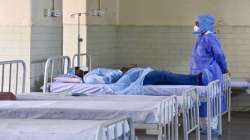Respiratory complications haunt Covid-19 recovered patients: Study
A team of health experts, including those of Indian-origin, has found that people who recovered from the Covid-19 disease are being commonly readmitted to the hospital within 14 days of being discharged majorly for respiratory complications.

A team of health experts, including those of Indian-origin, has found that people who recovered from the Covid-19 disease are being commonly readmitted to the hospital within 14 days of being discharged majorly for respiratory complications.
Researchers found the most common cause for a patient's early hospital readmission after discharge was for respiratory distress.
These patients were also more likely to have other ailments including chronic obstructive pulmonary disease and hypertension, said Girish Nadkarni and Anuradha Lala from the Icahn School of Medicine at Mount Sinai Hospital in the US.
"This study shows that many patients have lingering effects from hospitalisation for Covid-19 and thus, there is opportunity for longitudinal studies that could further assess the long-term effects of Covid on patient outcomes when they are discharged," Nadkarni said.
Of the nearly 2,900 discharged patients, more than 100 returned for emergency care after about 4.5 days and 56 of those returning patients required readmittance into the hospital.
Half the patients returned for respiratory complications. Compared to patients who did not return, those returning had higher rates of chronic obstructive pulmonary disease and hypertension.
Patients who returned also had a shorter length hospital stay during treatment, lower rates of anticoagulation treatment, and were less likely to require intensive care.
Age, sex, and race/ethnicity were no different among readmitted patients compared to those who did not return.
"As we move into a phase where Covid-19 is no longer a novel disease, we must transition our attention to the post-acute phase to understand how to keep patients well and out of the hospital," Lala said.
The findings provide insight that can potentially lead to improved care for patients hospitalised with Covid-19 to reduce both complications after discharge and hospital readmissions, the authors wrote in a paper published in the Journal of General Internal Medicine.